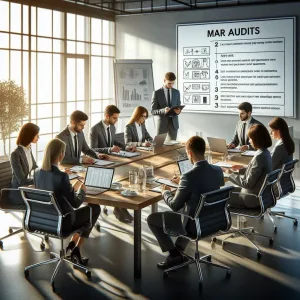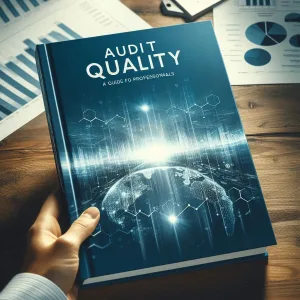Vendor auditing is a systematic evaluation of a vendor’s processes, controls, and compliance with established standards. This practice is crucial for organizations to ensure that their vendors operate effectively and align with the company’s risk management strategies. By conducting thorough vendor audits, internal auditors can assess the reliability, performance, and compliance of third-party suppliers, which is essential for maintaining a secure and compliant business environment [1][6].
The significance of vendor auditing in internal audit processes cannot be overstated. It serves as a critical component of third-party risk management, helping organizations identify potential issues that could impact their operations, reputation, and financial stability. Effective vendor audits allow internal auditors to review vendor selection processes, contract negotiations, and compliance with contractual terms, ensuring that the organization maintains strong relationships with its suppliers [3][4].
However, vendor management is not without its risks. Organizations face various challenges, including the potential for vendor non-compliance, data breaches, and operational disruptions. These risks can arise from inadequate vendor oversight, lack of transparency, or failure to adhere to regulatory requirements. For instance, in industries such as pharmaceuticals and medical devices, regulatory agencies mandate internal and supplier audits to ensure product safety and efficacy [7]. Therefore, a robust vendor auditing process is essential to mitigate these risks and safeguard the organization’s interests.
In recent years, the integration of technology, particularly artificial intelligence (AI), has emerged as a transformative force in enhancing vendor audits. By leveraging AI, internal audit teams can improve efficiencies in various areas, such as data analysis, risk assessment, and compliance monitoring. AI-driven tools can analyze vast amounts of data to identify patterns and anomalies, enabling auditors to focus on high-risk areas and streamline their audit processes [10][11]. This technological advancement not only enhances the effectiveness of vendor audits but also empowers internal auditors to make more informed decisions, ultimately leading to better vendor management and reduced risk exposure [12].
Vendor auditing is a vital aspect of internal audit processes that helps organizations manage risks associated with vendor relationships. By embracing technology and AI, internal auditors can significantly enhance the efficiency and effectiveness of their vendor audits, ensuring that they are well-equipped to navigate the complexities of today’s business landscape.
The Current State of Vendor Auditing
Vendor auditing is a critical component of internal audit processes, ensuring that suppliers meet compliance standards and maintain operational integrity. However, traditional methodologies often face significant challenges that hinder their effectiveness. Here’s an overview of the common practices, their limitations, and the pressing need for enhanced processes.
Common Methodologies Used in Vendor Auditing
- Document Review: Auditors typically begin with a thorough examination of vendor documentation, including contracts, compliance reports, and quality assurance records. This helps establish a baseline for evaluating vendor performance and adherence to standards.
- On-Site Inspections: Physical audits involve visiting vendor facilities to assess operational practices, security measures, and overall compliance with contractual obligations. This hands-on approach allows auditors to gather firsthand insights into vendor operations.
- Interviews and Surveys: Engaging with vendor personnel through interviews and surveys can provide valuable qualitative data regarding their processes, challenges, and compliance culture. This method helps auditors understand the vendor’s perspective and operational realities.
- Performance Metrics Analysis: Auditors often rely on key performance indicators (KPIs) to evaluate vendor performance quantitatively. This includes analyzing delivery times, quality control metrics, and incident reports to gauge reliability and efficiency.
Challenges and Inefficiencies in Current Practices
Despite the established methodologies, traditional vendor auditing practices face several challenges:
- Time-Consuming Processes: The manual nature of document reviews and on-site inspections can lead to lengthy audit cycles, delaying the identification of compliance issues and operational risks [1].
- Inconsistent Quality: Variability in auditor expertise and experience can result in inconsistent audit quality. Different auditors may interpret compliance standards differently, leading to discrepancies in findings [2].
- Limited Scope: Traditional audits often focus on historical data and compliance checks, which may overlook emerging risks and evolving vendor capabilities. This narrow focus can leave organizations vulnerable to unforeseen issues [3].
- Data Management Issues: The increasing volume of data generated by vendors can overwhelm traditional audit processes. Manual data handling is prone to errors and inefficiencies, making it difficult to maintain accurate and up-to-date records [4].
The Need for Improved Audit Processes
As vendor complexities continue to grow, driven by globalization and technological advancements, the limitations of traditional auditing practices become more pronounced. Organizations must adapt to these changes by:
- Embracing Technology: Leveraging advanced technologies, such as artificial intelligence (AI), can streamline audit processes, enhance data analysis, and improve overall efficiency. AI can automate routine tasks, allowing auditors to focus on higher-value activities [5].
- Enhancing Risk Assessment: A more dynamic approach to risk assessment is essential. By integrating real-time data analytics and continuous monitoring, organizations can proactively identify and mitigate risks associated with vendor relationships.
- Fostering Collaboration: Improved communication and collaboration between auditors and vendors can lead to better understanding and alignment on compliance expectations. This partnership approach can enhance transparency and accountability [7].
While traditional vendor auditing practices have served their purpose, the evolving landscape necessitates a shift towards more efficient and effective methodologies. By embracing technology and rethinking audit processes, organizations can better navigate the complexities of vendor management and ensure robust compliance.
The Role of AI in Vendor Auditing
In the rapidly evolving landscape of internal auditing, artificial intelligence (AI) is emerging as a transformative force, particularly in the realm of vendor auditing. By leveraging advanced technologies such as machine learning and natural language processing, internal auditors can enhance their efficiency and effectiveness in evaluating vendor performance and compliance. Here’s how AI is reshaping the vendor auditing process:
Introduction to AI Technologies Relevant to Auditing
- Machine Learning (ML): This subset of AI enables systems to learn from data and improve their performance over time without being explicitly programmed. In vendor auditing, ML algorithms can analyze vast amounts of vendor data to identify trends and predict future performance, allowing auditors to make informed decisions based on historical data patterns.
- Natural Language Processing (NLP): NLP allows machines to understand and interpret human language. This technology can be utilized to analyze contracts, compliance documents, and audit reports, extracting relevant information and insights that would otherwise require extensive manual review.
Automating Data Collection and Analysis
AI significantly streamlines the data collection process, reducing the time and effort required for auditors to gather and analyze vendor information. By automating these tasks, auditors can focus on higher-level analysis and strategic decision-making. Key benefits include:
- Efficiency: AI tools can quickly aggregate data from various sources, including financial records, compliance reports, and performance metrics, ensuring that auditors have access to comprehensive and up-to-date information.
- Consistency: Automated data collection minimizes human error and ensures that the same standards are applied across all vendor evaluations, leading to more reliable audit outcomes.
Identifying Patterns and Anomalies in Vendor Data
One of the most powerful applications of AI in vendor auditing is its ability to detect patterns and anomalies within large datasets. This capability is crucial for identifying potential risks and compliance issues. Here’s how AI enhances this aspect of auditing:
- Pattern Recognition: AI algorithms can analyze historical vendor performance data to identify normal operating patterns. By establishing a baseline, auditors can more easily spot deviations that may indicate underlying issues, such as financial instability or compliance failures.
- Anomaly Detection: AI can flag unusual transactions or behaviors that deviate from established patterns, prompting auditors to investigate further. This proactive approach helps organizations mitigate risks before they escalate into significant problems.
The integration of AI technologies into vendor auditing processes is revolutionizing how internal auditors operate. By automating data collection and analysis, as well as enhancing the ability to identify patterns and anomalies, AI not only improves audit efficiency but also strengthens the overall risk management framework within organizations. As technology continues to advance, internal auditors must embrace these innovations to stay ahead in an increasingly complex vendor landscape.
Enhancing Audit Efficiency with AI
In the realm of internal auditing, particularly in vendor auditing, the integration of artificial intelligence (AI) is revolutionizing traditional practices. By leveraging AI technologies, internal auditors can significantly enhance the efficiency and effectiveness of their audits. Here are some specific ways AI is transforming vendor auditing:
- Speed and Accuracy Improvements in Data Processing: AI technologies can process vast amounts of data at unprecedented speeds, allowing auditors to analyze vendor performance metrics and compliance data more quickly than ever before. This rapid data processing not only accelerates the audit timeline but also enhances accuracy by minimizing human error. AI algorithms can identify patterns and anomalies in data that might be overlooked in manual reviews, ensuring a more thorough examination of vendor activities and compliance with contractual obligations [11][12].
- Facilitating Continuous Monitoring of Vendor Compliance: One of the most significant advantages of AI in vendor auditing is its ability to enable continuous monitoring. Traditional audits often occur at set intervals, which can leave gaps in compliance oversight. AI systems can continuously analyze vendor data in real-time, flagging any compliance issues as they arise. This proactive approach allows organizations to address potential risks immediately, rather than waiting for the next scheduled audit, thereby enhancing overall vendor management and compliance assurance [9][10].
- Role in Risk Assessment and Prioritization During Audits: AI plays a crucial role in risk assessment by utilizing data analytics to identify high-risk vendors and areas that require more focused scrutiny. By analyzing historical data and current performance metrics, AI can help auditors prioritize their efforts on vendors that pose the greatest risk to the organization. This targeted approach not only optimizes resource allocation but also ensures that critical compliance issues are addressed promptly, thereby reducing the likelihood of significant audit findings or compliance breaches [14].
The integration of AI into vendor auditing processes is not just a trend but a transformative shift that enhances audit efficiency. By improving speed and accuracy in data processing, facilitating continuous compliance monitoring, and aiding in risk assessment and prioritization, AI empowers internal auditors to perform their roles more effectively and strategically. As technology continues to evolve, embracing these advancements will be essential for organizations aiming to maintain robust vendor management practices.
Challenges and Considerations
As organizations increasingly turn to artificial intelligence (AI) to enhance their vendor auditing processes, it is crucial to address the potential challenges and ethical considerations that accompany this technological shift. Here are some key points to consider:
Common Barriers to AI Adoption in Audit Functions
System Disparity: One of the primary challenges in implementing AI for vendor auditing is the need for reliable and standardized data. AI systems require consistent data inputs to function effectively, and many organizations struggle with disparate systems that do not communicate seamlessly. This lack of integration can hinder the ability to ingest and analyze data efficiently, ultimately affecting the quality of the audit process.
Data Quality and Integrity: Ensuring the quality and integrity of data is paramount when utilizing AI in audits. AI algorithms heavily rely on accurate data to produce reliable outcomes. If the data is flawed or incomplete, it can lead to incorrect conclusions and undermine the audit’s effectiveness [15].
Regulatory Compliance: The integration of AI in auditing must also navigate complex regulatory landscapes. Organizations need to ensure that their AI systems comply with relevant laws and standards, which can vary significantly across jurisdictions. This compliance requirement can pose a barrier to the swift adoption of AI technologies in vendor auditing.
Data Privacy and Security Concerns
Sensitive Information Handling: The use of AI in vendor auditing raises significant concerns regarding the handling and distribution of sensitive information. There is a risk that AI systems may inadvertently expose confidential data or use it without the explicit consent of the individuals involved. Audit firms must implement robust data governance frameworks to mitigate these risks and protect sensitive information [5].
Algorithmic Bias: AI systems can be susceptible to biases inherent in the data they are trained on. If not carefully monitored, these biases can lead to unfair treatment of vendors or skewed audit results. It is essential for organizations to establish oversight mechanisms to regularly assess and address potential biases in AI algorithms.
Importance of Human Oversight in AI-Driven Audits
Augmenting Human Expertise: While AI can significantly enhance the efficiency of vendor audits, it should not replace human auditors. The role of human oversight remains critical in interpreting AI-generated insights and making informed decisions. Auditors bring specialized expertise and contextual understanding that AI cannot replicate, ensuring that audits maintain their integrity and quality [13].
Governance and Control: Internal audit professionals must establish robust governance processes around the use of AI in vendor auditing. This includes developing controls for the use, development, testing, and access of AI systems. By maintaining a balance between technological advancement and human oversight, organizations can leverage AI’s capabilities while safeguarding audit quality.
While AI presents transformative opportunities for vendor auditing, it is essential to navigate the associated challenges and ethical considerations carefully. By addressing barriers to adoption, ensuring data privacy and security, and emphasizing the importance of human oversight, organizations can effectively harness AI to enhance their audit efficiency while maintaining the integrity of the auditing process.
The Future of Vendor Auditing with AI
As the landscape of internal auditing evolves, the integration of artificial intelligence (AI) is poised to revolutionize vendor auditing. This transformation is not merely a trend but a significant shift that promises to enhance efficiency, accuracy, and insight in audit processes. Here are some key points to consider regarding the future of vendor auditing with AI:
Predicting Advancements in AI Technology
The rapid advancement of AI technology is expected to bring about profound changes in how internal audits are conducted. Future developments may include:
- Enhanced Data Analytics: AI will enable auditors to analyze vast amounts of vendor data more effectively, identifying patterns and anomalies that would be difficult to detect manually. This capability will allow for more thorough assessments of vendor performance and compliance with contractual obligations [12].
- Real-Time Monitoring: With AI, auditors can implement real-time monitoring systems that continuously assess vendor activities. This proactive approach will help in identifying potential risks and issues before they escalate, thereby enhancing the overall audit process [14].
- Predictive Analytics: AI’s predictive capabilities will allow auditors to forecast potential vendor-related risks based on historical data and trends, enabling more strategic decision-making.
New Audit Approaches and Methodologies
The integration of AI into vendor auditing is likely to lead to the development of innovative audit methodologies. Some potential changes include:
- Automation of Routine Tasks: AI can automate repetitive audit tasks, such as data entry and preliminary analysis, freeing up auditors to focus on more complex and strategic aspects of vendor management. This shift will enhance the efficiency of the audit process and allow for deeper insights into vendor relationships.
- Anomaly Detection: AI-driven tools will enhance the ability to detect unusual transactions or behaviors among vendors, providing auditors with the capability to investigate issues that may indicate fraud or non-compliance [10]. This will lead to more robust audit findings and recommendations.
- Customized Audit Plans: AI can assist in tailoring audit plans based on specific vendor characteristics and risk profiles, ensuring that audits are more relevant and targeted [12].
Importance of Continuous Learning and Adaptation
As AI continues to reshape the auditing landscape, internal auditors must prioritize continuous learning and adaptation. Key considerations include:
- Skill Development: Auditors will need to develop new skills to effectively leverage AI technologies. This includes understanding AI tools, data analytics, and the ethical implications of using AI in auditing [15]. Ongoing training and professional development will be essential to stay ahead in this evolving field.
- Adaptation to Technological Changes: The rapid pace of technological advancement means that auditors must be agile and willing to adapt their practices. Embracing new technologies and methodologies will be crucial for maintaining relevance and effectiveness in vendor auditing [7].
- Collaboration with IT Professionals: As AI becomes more integrated into auditing processes, collaboration between auditors and IT professionals will be vital. This partnership will ensure that auditors can effectively utilize AI tools while also addressing any technical challenges that may arise [12].
The future of vendor auditing is bright with the promise of AI. By embracing these advancements, internal auditors can enhance their efficiency and effectiveness, ultimately providing greater value to their organizations. The journey ahead will require a commitment to continuous learning and adaptation, ensuring that auditors are well-equipped to navigate the complexities of an AI-driven auditing landscape.
Conclusion
In conclusion, the integration of artificial intelligence (AI) into vendor auditing is revolutionizing the way internal auditors approach their tasks, significantly enhancing efficiency and effectiveness. The transformative impact of AI can be summarized through the following key points:
- Enhanced Audit Efficiency: AI technologies streamline the auditing process by automating routine tasks, allowing auditors to focus on high-value activities such as critical thinking and strategic decision-making. This shift not only improves the quality of audits but also enables auditors to target high-risk areas more effectively using data analytics, thereby mitigating risks more efficiently [10][11].
- Encouragement to Explore AI Solutions: Internal auditors are encouraged to actively explore and adopt AI solutions tailored to their specific needs. By leveraging AI tools, auditors can enhance their capabilities, uncover new insights, and improve overall audit performance. The adoption of these technologies is not merely a trend but a necessary evolution in the auditing landscape [12].
- Staying Informed About Technological Advancements: It is crucial for internal auditors and tech-savvy professionals to remain informed about the latest technological advancements in the field. Continuous learning and adaptation to new tools and methodologies will ensure that auditors can maintain their relevance and effectiveness in an increasingly complex environment [6][15].
By embracing AI in vendor auditing, organizations can not only improve their audit processes but also position themselves for future success in a rapidly changing technological landscape. The journey towards integrating AI is one that promises to yield significant benefits, making it an essential consideration for all internal auditors.
Call to Action
As we delve into the transformative impact of artificial intelligence on vendor auditing, we invite you to reflect on your own experiences. Have you integrated AI solutions into your auditing processes? What challenges have you faced, and what successes have you celebrated? Sharing your insights can foster a community of learning and innovation among internal auditors and tech-savvy professionals.
We encourage you to stay informed about the latest advancements in auditing technologies. By subscribing to our updates, you will gain access to valuable information, best practices, and emerging trends that can enhance your vendor auditing processes. Don’t miss out on the opportunity to elevate your auditing strategies with cutting-edge tools and insights.
By engaging with these resources, you can position yourself at the forefront of the evolving landscape of vendor auditing. Together, let’s harness the power of technology to create more efficient, effective, and insightful auditing practices.
Find out more about Shaun Stoltz https://www.shaunstoltz.com/about/
This post was written by an AI and reviewed/edited by a human.



